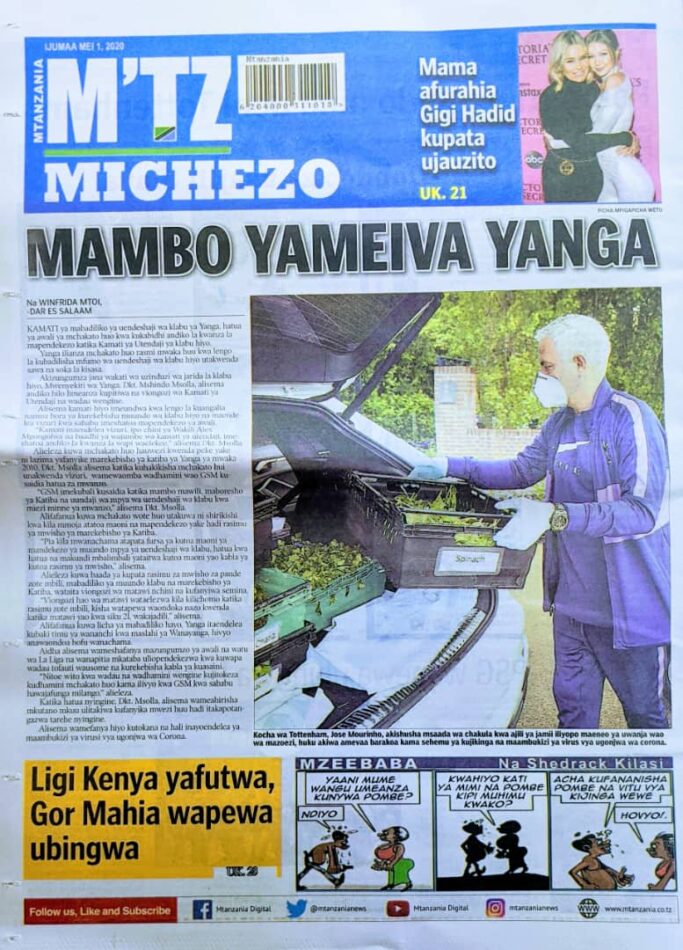
Kariuki Ngari, Standard Chartered Bank CEO. FILE PHOTO | NMG
COVID-19 has shattered the traditional approached to work.
What
worked before the pandemic is now being looked at with caution, as new
ways of productivity and meeting in the work place shifts the ball to
the court of technology.
This led us
to seek the opinions of chief executives in various organizations and
sectors to see how their out of office work experience has been since
the government encouraged people to work from home to curb rising
infections of this unseen enemy.
We received interesting and divergent views. Here’s what they had to say.
Kariuki Ngari, Standard Chartered Bank CEO
What does working out of the office mean for you? How are you handling not being in the boardroom?
Previously
when we would work from home it was for a day. But now it’s materially
different because all meetings are virtual, all engagement is virtual.
If there are documents to sign, some of those documents are brought from
abroad to home.
Also we are all used
to a schedule. You wake up at a certain hour, you take a shower, and
you get into the car you come to the office. Now it’s different. You
have the same morning ritual but then you don’t leave the house.
Just
the fact that you’re in the house working alone is very different. In a
normal office environment you’re talking to colleagues, people are come
into your office for meetings, you’re going to the boardroom for
meetings, and you’re going to new clients.
How
do you cope with “distractions” from family? Do you have a set
schedule, home office that’s out of bounds for the kids and other family
members to enable you to work with singular focus?
I think the good thing for me is all my children are grown. They’re not in the house.
I
don’t have that problem so it’s just Carol and I at the house; it
speaks a whole world of difference. I don’t have to contend for
anything, for Wi-Fi, or the kids around thinking “why is dad at home?”
It’s
just us now utilising spaces differently; because obviously Carol is
also having meetings virtually so we change positions, sometimes you are
in the study room, sometimes in the sitting room; other times the
dining room, different places just to keep on moving so that makes it
quite a different environment so I don’t have the pressure.
The
biggest challenge is really that home was a place to go and rest. In my
entire career I’ve always tried not to take work home. I work late in
the office; I try not to work late at home. But now it’s very very
different because you’re there the whole day, so do you continue working
into the night? That is making things dicey I must say.
With
the current covid-19 situation, you are bringing work home. How does
your family react to seeing you in “work mode”? How do you balance this
with family time?
I think
there’s no problem. As I mentioned earlier with Carol is she is also
doing her own stuff so we’re coping. It’s because working from home has
become the norm. So there’s no issue.
Now
it’s adjusting to the new normal which is working from home and
realizing that the home is not just a place for resting; but it’s a
place for working as well: it’s an office.
Mental
health is important. You've got to take care of yourself first before
you can care for others. How are you able to do this confined to one
location, indoors?
Mental health is real. And it’s a real challenge. I remember after my first seven days, I was like “wow, this is tough!”
First of all there are a couple of things that I’ve realized. By the time I was on the 10th, 11th day, I was like this is very serious. I was taking mental health lightly but now I take it a lot more seriously.
One
of the things is you have to focus on other things. Right now, if you
focus on the news media, there’s a constant stream of negative news,
it’s all about COVID. So your mind is just saturated with negative news.
For me, it’s making the deliberate effort to focus on positivity,
knowing that yes this is a challenging thing but how do I make sure that
my staff, colleagues are safe? As you know banking is an essential
service, how do they make sure that even as they continue serving
others, they are safe? Also participating in some of the events we’ve
organized as a bank on mental health that has also helped.
The
tips that you hear, how to focus on the positive, this is a challenge,
do not worry about the things you cannot control, being conscious about
that, which is really helping as well. I think it is being conscious
that in an environment like this, CEOs love being in control, this is
not something you can be in control about, so you don’t have to stress
about it. But most important is to what you must do on the things that
you can control; so staying safe, listening to what the government is
advising, social distancing, and most important, enabling colleagues to
do the same, not only with the social distancing or the gadgets they
need but also on the technology they require to stay safe, that makes a
big difference.
James Mworia, Group CEO, Centum Investment. FILE PHOTO | NMG
James Mworia, Group CEO, Centum Investment
What does working out of the office mean for you?
Even
before the coronavirus lockdown, I was able to perform almost all my
office work from any part of the world. High level of connectivity has
meant that we move with our offices in our phones, our laptops and other
gadgets. I’m not working entirely from home, but I have significantly
reduced my presence in the office. Of course it is different now, since
working offsite before Covid-19 was greatly supported by other staff who
were physically present in the office. Now we’re talking of nearly
everybody working from home, and that presents a challenge when you need
to sign and move documents around.
How are you handling not being in the boardroom?
Our board meetings are going on as usual, only this time through online platforms.
In what ways does it differ from your regular schedule?
I’m
an early riser, a routine I partly developed to help beat the morning
traffic to work and also get most of my things done in morning hours.
This has not changed; I still wake up early but I now find I have more
time to exercise and interact a little more with my family when I do not
have to go to the office. But my days still start early and end late.
Of course the curfew means we're home early, and that is good for family
time. The pandemic has made it even more critical to have a thorough
and constant appraisal of the business and also undertake a lot of
scenario mapping so that we're ready to hit the ground running once
things return to normal.
How do you cope with the "distractions" from family?
We
have developed a work-and-school-from-home framework that keeps
everyone busy at the same time, and take breaks together to avoid the
distractions. This is working well.
Do
you have a set schedule, home office that's out of bounds for the kids
and other family members to enable you to work with singular focus?
What
helps is our work-and-school-from-home framework, which keeps everyone
occupied at the same time and we also have common breaks so there's
really no need to lock up oneself since everyone understands. With the
current covid-19 situation, you are bringing work home.
How does your family react to seeing you in "work mode"?
My
family has always been understanding, even before the coronavirus
pandemic, when I needed to take a minute to attend to an urgent work
matter. That hasn't changed, and of course this has affected everyone so
they're also occupied with their work and school.
How do you balance this with family time?
Family,
of course, always comes first and this has not changed at all. In any
case, now there's more time for closer interactions.
Elema Halakhe Anti Counterfeit Agency Executive Director. FILE PHOTO | NMG
Elema Halakhe Anti Counterfeit Agency Executive Director
What does working out of office mean for you? How are you handling not being in the boardroom?
It
means that work has not stopped and employees are executing their roles
from home in respect to social distancing directives. It is a matter of
changing the mode of our engagement and formats of our interactions
while executing our roles.
We are
following government directives and checking best practices from our
peers on how to work from home. We changed our interaction and
communication processes into online for most of our services and
communications. I have a team that adapted to the new order and
technology very fast making the transition seamless.
In what ways does it differ from your regular schedule? How do you cope with ‘distractions’ from family?
The difference is the Place of operation since we are still executing our mandate as a government agency as usual.
I
don’t look at it as distraction per-se but also a chance to make better
relationships with our families. Family members can get a chance to
understand the work I/you do and children may take it up a
responsibility challenge. There is also fun and bonding in between to
be with your family.
Do you
have a set schedule, home office, that is out of bounds for the children
and other family members to enable you work with singular focus?
With
Covid-19 we have to change the way we do business at all levels. I have
taken a flexible path and put up some office arrangements at home. None
of the office arrangement is out of bounds for anybody. Children have
enough school work and clear responsibilities such that everyone
delivers on his/her own work with minimal disruptions.
With
the current Covid-19 situation, you are bringing work home. How does
your family react to seeing you in ‘work mode’? How do you balance this
with the family?
At first it was difficult for them to understand but communication played a key role in making them understand the situation.
I
had to get real to them but also assigning roles that were not in
conflict with my working schedule. I had a responsibility to make them
understand the circumstances behind being home and at work. This may be
hard for them and for everyone but it is inevitable. Instituting instant
change at family level maybe a tall order but we need our children to
understand the basics.
Mental
health is important; you’ve got to take care of yourself first before
you can take care of others. How are you able to do this confined to one
location, indoors?
As a
leader the pressure that comes with working in times like this demands
one to have a lot of flexibility since a lot is expected of you. You
will definitely need to take care of your emotional and physical health
in order to deliver as expected. The same should be extended to your
employees.
Because of the
restrictions of working from home, you have to regularly take time to
communicate with them virtually through conference calls or WhatsApp
groups or any other online platforms and get to share their feelings and
concerns, exchange their experiences and support each other.
Andrew Cowan, Group Md, EABL. FILE PHOTO | NMG
Andrew Cowan, Group Md, EABL
What does working out of the office mean for you?
It
has required an adjustment to how I interact with colleagues – it’s
structurally less “spontaneous” and my natural style to “pop over for a
quick chat” has required me to find different ways in feeding that
natural need for interaction.
How are you handling not being in the boardroom?
It’s
amazing how quickly we normalize new ways of working. Video
conferencing has become our new norm in conducting meetings. The one we
use is reliable, intuitive and functional. However, what has needed to
change is meeting etiquette. In a room where you can read someone’s body
language, it’s easy to read when someone wants to make a contribution
or raise a point. Video conferencing numbs that instinctive read of body
language that allows everyone to make their points. I have found
myself spending more time “going round the room” to check if everyone
has made all the points they want to. It’s turned out to be a great
discipline actually – by stopping and asking someone if they are happy
to move on or have further points to raise is a mark of respect for that
person’s role in the meeting. I really like it, and when we return to
whatever our new normal is post Covid-19, it’s a methodology for
contribution that I am going to take back into the physical environment.
In what ways does it differ from your regular schedule?
I
am spending a lot of time overseeing the crisis management mode we are
in right now. Every crisis meeting update starts with a check-in of the
wellbeing of our people. Are they safe and well? Are they getting the
PPE support they need from EABL? Are their home circumstances
commensurate with a safe and productive working environment? We are also
focused on supporting our communities.
How do you cope with the distractions “from family”?
I
have a very energetic and fun 7 year old daughter who is home schooling
at the moment. We have created a formal structure to her and my
day, and a formal demarcation to our home space; I have a room called
work, she has a room called school. She is getting school tasks sent to
her via Google Classroom each day and my wife is supporting her learning
and completion of those tasks. I, in my office, use headphones for
meetings so not to distract her – again, it’s amazing how quickly it
becomes a new normal. In fact kids adjust faster than adults don’t
they?! I stop for lunch and we eat together. I try (not always
successfully) to stop at the end of normal working hours and we play
together – just as we would normally do.
Do you have a set schedule to enable you to work with singular focus?
Looking
after ourselves is important. I love running. I go out first thing
every morning for a run. It really sets me up for the day and puts me in
a great mood! Please remember your own wellbeing formula- it’s
important to look after yourself.
Additionally,
I have family in the UK. My parents are aged and have been isolating
for two months now. Being 6,500kms away has not been easy in this
context. I videoconference my Dad pretty much every day and swap
stories, no matter now seemingly trivial, about how the day has
unfolded. He’s a great guy and keeps going on about this being similar
to going into the bunkers during WW2. Anyway, they have a nice garden,
plenty of food and this time of year in the UK is beautiful as Spring
emerges and the long hot summer days prevail.
With the current Covid-19 situation, you naturally bring work home. How does your family react to seeing you in “work mode”?
My
“work me” doesn’t really differ from my “home me” although obviously my
daughter has had to adjust with me being consumed by something that’s
not her! At the beginning of this new way, there was a little bit of her
getting frustrated and on one occasion quite upset that I was home but
unavailable to respond to her as attentively as normal, due to work. The
key is not to get angry – she is adjusting too, so taking the time to
explain why things are a little different, but also demonstrating that
the non-work hours at home are strictly for family, has helped her
develop her own rhythm and routine.
How do you balance this with family time?
I
try to be really strict to keep work hours for work and out of work
hours for family. I’ve not mentioned my wife much, but she has had to
adjust too. She is dedicating huge parts of the day now to home
schooling my daughter. She is seeing very little of her friends,
although the WhatsApp groups are melting her phone. She is calling her
mother in Ireland daily as she is on her own and needs company and
stimulation and of course she is seeing way more of me than she is used
to! She remains an absolute rock and I feel grateful for having her as
the backbone of our household.
Jumia Food managing director, East Africa Shreenal Ruparelia. FILE PHOTO | NMG
Shreenal Ruparelia, Regional Managing Director for East Africa, Jumia Food
What does working out of the office mean for you? How are you handling not being in the boardroom?
Working
from the office means you are interacting with your colleagues
regularly, there is room for open discussions and continuous problem
solving. During the early onset of Covid-19 in Kenya, you certainly need
to adapt to a new routine which includes developing clear expectations
of deliverables, communicating clearly on timelines and being empathetic
towards teams who are having to deal with adjusting to working from
home.
In what way does it differ from your schedule?
It
hasn’t really changed much except that you need to organise yourself
better and how you manage teams. In some cases you tend to have frequent
check-ins with your teams, which fosters deeper collaborations with
colleagues and peers. This brings about a deeper sense of unity and
accountability as all interactions are done remotely and over conference
calls. I do encourage my teams to switch on videos so you can
appreciate their life at home and it has a human face to interactions.
How
do you cope with the distractions of family ?Do You have a set schedule
at home, office that are out of bounds for the kids and other family
members to enable you to work with singular focus?
The best way I’ve discovered to be productive at home and have quality time with family is having a set routine.
Some
of the tips that can help in creating those boundaries include setting
up a workstation that is just meant for work, dressing up in a manner
that sets you up to be productive, eating well in order to keep energy
levels up and also have a set task list to complete for the day can
help. These structures help with a productive workday.
With
the current covid-19 situation you are bringing work home. How does
your family react to seeing you in “working mode”. How do you balance
this with family time?
My family has seen me in my “work mode” so it’s not as different now.
I
do however make sure to switch off from work when it is time to engage
with friends and family regularly. It’s very easy to continue working
long hours when at home so I do believe that it’s important to have set
boundaries for work vs time with family and friends. Zoom calls/drinks
and always add some fun during personal interactions :)
Mental
Health is important. You’ve got to take care of yourself first before
you can take care of others. How are you able to do this confined to one
location, indoors?
I do
yoga every day without fail, I find this helps in focusing and
de-stressing before or after a long day. Eating right is super important
so it keeps energy levels up. And then finally doing activities that
you enjoy such as cooking, reading or painting can help in disengaging
your brain and keep the pressure off. It’s a marathon not a sprint so
personal wellbeing and health is very important.
Adil Youssefi, Regional CEO of East Africa, Liquid Telecom. FILE PHOTO | NMG
Adil Youssefi, Regional CEO of East Africa, Liquid Telecom
What does working out of the office mean for you?
It presents both opportunities and challenges:
· I can get more done as interruptions are less frequent.
· I can use breaks to spend time with my family
·
It is more difficult to relate to team members compared to physical
interactions such as reading their emotions and positively influencing
their energy level…etc
· It is more difficult to have a break between work and family time.
How are you handling not being in the boardroom?
As best as I can. What helps me is to:
· To keep a schedule where possible.
· Lock calendar time to address the most important items with the relevant stakeholders.
· Interact with my direct report to check that they are ok and to assess productivity.
In what ways does it differ from your regular schedule?
There
are no boundaries between office and home time. Thus it is important to
have a schedule and to calendar the important items to be attended to.
How do you cope with the "distractions" from family?
I
have a great wife and kids who help! I try to spend quality time with
them, help with house chores and let them when my office is an out of
bound zone.
Do you have a set
schedule, home office that's out of bounds for the kids and other
family members to enable you to work with singular focus?
I
do a schedule and an out of bound office is a must. It is also
important to balance that with dedicated and quality time with the
family.
With the current covid-19 situation, you are bringing work home. How does your family react to seeing you in "work mode"?
It
is challenging as my wife is also working from home and schooling the
kids. On my part it is important to ensure that the “work mode” is the
“home mode” One needs to be authentic throughout the day and have the
same empathy, drive and care in the office and at home.
How do you balance this with family time?
I
have a schedule for family time as well. I try to ensure quality time
rather than quantity. Games, laughter, exercise are fun.
Mental
health is important. You've got to take care of yourself first before
you can care for others. How are you able to do this confined to one
location, indoors?
Sports
and music help me a lot. I exercise early in the morning three times a
week and listen to music during my off time. Having a routine keeps me
grounded.
 Quickmart Supermarket branch on Waiyaki Way in Nairobi PHOTO | SALATON NJAU | NMG
Quickmart Supermarket branch on Waiyaki Way in Nairobi PHOTO | SALATON NJAU | NMG





 Retirement Benefits Authority (RBA) chief executive Nzomo Mutuku. FILE PHOTO | NMG
Retirement Benefits Authority (RBA) chief executive Nzomo Mutuku. FILE PHOTO | NMG

 The European Union (EU), Denmark and the African Development Bank (AfDB)
have signed a partnership deal that will see 2,400 agribusinesses in
eight counties. FILE PHOTO | NMG
The European Union (EU), Denmark and the African Development Bank (AfDB)
have signed a partnership deal that will see 2,400 agribusinesses in
eight counties. FILE PHOTO | NMG
 Spikes in foodstuff prices and commuter fares have reversed gains from
recent tax cuts and falling oil prices, pushing up the April inflation
rate to 5.62 percent. FILE PHOTO | NMG
Spikes in foodstuff prices and commuter fares have reversed gains from
recent tax cuts and falling oil prices, pushing up the April inflation
rate to 5.62 percent. FILE PHOTO | NMG

 Kenyans at a past public gathering. FILE PHOTO | NMG
Kenyans at a past public gathering. FILE PHOTO | NMG

 Kariuki Ngari, Standard Chartered Bank CEO. FILE PHOTO | NMG
Kariuki Ngari, Standard Chartered Bank CEO. FILE PHOTO | NMG





 Travelers upsurge at Machakos Country Bus in Nairobi. FILE PHOTO | NMG
Travelers upsurge at Machakos Country Bus in Nairobi. FILE PHOTO | NMG

 President Uhuru Kenyatta. FILE PHOTO | NMG
President Uhuru Kenyatta. FILE PHOTO | NMG

 Scangroup CEO Bharat Thakrar. FILE PHOTO | NMG
Scangroup CEO Bharat Thakrar. FILE PHOTO | NMG

 The number of Kenyans who acquired passports rose by 85.4 percent last
year as the State moved to open up more issuance centres locally and
abroad. FILE PHOTO | NMG
The number of Kenyans who acquired passports rose by 85.4 percent last
year as the State moved to open up more issuance centres locally and
abroad. FILE PHOTO | NMG

 Central Bank of Kenya (CBK). FILE PHOTO | NMG
Central Bank of Kenya (CBK). FILE PHOTO | NMG

 KRA boss James Mburu. FILE PHOTO | NMG
KRA boss James Mburu. FILE PHOTO | NMG

 Nairobi Securities Exchange (NSE). FILE PHOTO | NMG
Nairobi Securities Exchange (NSE). FILE PHOTO | NMG


























